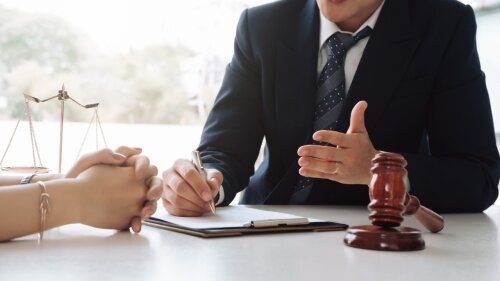Best Premises Liability Lawyers in West Virginia
Share your needs with us, get contacted by law firms.
Free. Takes 2 min.
Or refine your search by selecting a city:
List of the best lawyers in West Virginia, United States
About Premises Liability Law in West Virginia, United States
Premises liability law in West Virginia deals with the responsibility that property owners and occupiers have to maintain a reasonably safe environment for visitors. If someone is injured due to a dangerous or hazardous condition on someone else’s property, they may be eligible to file a premises liability claim. This area of law covers incidents occurring at residences, businesses, public spaces, and even government-owned locations. Common cases involve slip and falls, inadequate security, falling objects, or exposure to toxic substances.
Why You May Need a Lawyer
Hiring a lawyer is crucial if you have been hurt on another person's property and believe it was due to the property owner's negligence. You may need legal assistance in cases such as:
- Slip and fall accidents on wet or uneven surfaces
- Injuries caused by falling merchandise or unsafe structures
- Dog bites or animal attacks occurring on someone’s property
- Accidents due to poor lighting, lack of security, or broken stairways
- Child injuries in areas without proper fencing such as swimming pools
- Exposure to toxic chemicals or hazardous materials
- Injuries in public spaces due to inadequate signage or warnings
A lawyer can help determine if you have a valid case, gather evidence, negotiate with insurance companies, and represent you in court, ensuring your rights are fully protected throughout the process.
Local Laws Overview
West Virginia follows specific rules regarding premises liability. Some of the key aspects include:
- The status of the visitor is important - invitees, licensees, and trespassers are treated differently under the law.
- Property owners owe the highest duty of care to invitees - those invited onto the property for business purposes.
- For licensees (such as social guests), owners must warn of known dangers, but are not obligated to inspect for unknown hazards.
- Generally, owners do not owe a duty of care to trespassers, except in certain situations (such as child trespassers and attractive nuisance cases).
- West Virginia uses a modified comparative fault rule - if the injured person is found to be fifty percent or more at fault, they cannot recover damages.
- There is a two-year statute of limitations to file a premises liability lawsuit from the date of the injury.
Understanding these laws can be complex, so consulting a legal professional is recommended for guidance specific to your situation.
Frequently Asked Questions
What is considered a premises liability claim?
A premises liability claim arises when someone is injured on another's property due to unsafe conditions that the property owner should have addressed or warned about.
What should I do if I am injured on someone else's property?
Seek medical attention right away, document your injuries, report the incident to the property owner or manager, and take photographs of the hazardous condition if possible.
Do I need to prove the property owner was aware of the hazard?
You generally need to show that the property owner knew or should have known about the dangerous condition and failed to correct it or warn visitors.
What types of injuries are covered under premises liability?
Common injuries include broken bones, sprains, head injuries, lacerations, and illnesses from exposure to hazardous materials or conditions.
Can I file a claim if I was partially at fault for my injury?
Possibly. West Virginia’s modified comparative fault rule allows recovery as long as you are less than fifty percent responsible for the incident.
How long do I have to file a claim?
You have two years from the date of your injury to file a premises liability lawsuit in West Virginia.
Does premises liability apply to both residential and commercial properties?
Yes, it applies to injuries occurring on residential, commercial, public, and government properties.
Are store owners liable for every fall or injury in their shop?
Not always. Store owners are liable when they fail to maintain reasonable safety or do not warn of potential hazards they knew or should have known about.
What compensation can I recover from a premises liability case?
Potential damages include medical expenses, lost wages, pain and suffering, and other costs related to your injury.
Should I speak to the property owner's insurance company?
Do not provide statements or accept settlements without consulting your attorney, as insurance companies may try to minimize payouts.
Additional Resources
- West Virginia State Bar - Provides lawyer referral services and helpful legal information
- West Virginia Judiciary - Offers self-help resources and information about court procedures
- Consumer Protection Division of the West Virginia Attorney General’s Office
- Local legal aid organizations that may assist with premises liability cases for those with limited income
- Centers for Disease Control and Prevention (CDC) for prevention tips and safety information
Next Steps
If you have been injured due to unsafe conditions on someone else’s property in West Virginia, consider the following steps:
- Prioritize your health and get immediate medical care
- Document the scene, your injuries, and gather witness information
- Report the incident to the property owner, business, or proper authority
- Retain all related medical and expense records
- Contact a qualified premises liability attorney as soon as possible to review your case
An experienced lawyer can help you evaluate your claim, explain your rights, and guide you through the entire legal process to pursue fair compensation.
Lawzana helps you find the best lawyers and law firms in West Virginia through a curated and pre-screened list of qualified legal professionals. Our platform offers rankings and detailed profiles of attorneys and law firms, allowing you to compare based on practice areas, including Premises Liability, experience, and client feedback.
Each profile includes a description of the firm's areas of practice, client reviews, team members and partners, year of establishment, spoken languages, office locations, contact information, social media presence, and any published articles or resources. Most firms on our platform speak English and are experienced in both local and international legal matters.
Get a quote from top-rated law firms in West Virginia, United States — quickly, securely, and without unnecessary hassle.
Disclaimer:
The information provided on this page is for general informational purposes only and does not constitute legal advice. While we strive to ensure the accuracy and relevance of the content, legal information may change over time, and interpretations of the law can vary. You should always consult with a qualified legal professional for advice specific to your situation.
We disclaim all liability for actions taken or not taken based on the content of this page. If you believe any information is incorrect or outdated, please contact us, and we will review and update it where appropriate.
Browse premises liability law firms by city in West Virginia
Refine your search by selecting a city.










